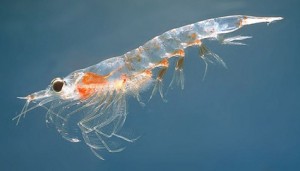A new popular product on the market is krill oil, a source of Omega-3 fatty acids similar to but different than fish oils. So, not surprisingly, since I carry fish oil supplements in my product line, I often get the question “Krill oil vs fish oil… which is better?”
First off, in case you’re wondering, “What the hey is a krill?”, it’s a tiny shrimp-like animal that swims around in the ocean by the bazillion. It sits at the bottom of the food chain and is food for all kinds of larger fish, including whales, who scoop them up by the bucketful and glup them down come feeding time. Like fish, they too contain Omega-3 fatty acids, so the reasoning goes, if we squeeze fish to get Omega-3s, why not share the love with krill and squeeze them for the same reason?
So now, we have companies popping up telling us that krill oil is the newer, better way to go, while the rest of us wonder what to think. The short answer? Fish oil still wins the day. Now let’s get a little deeper into the how and why.
Remember that we’re taking fish oil for the two big active ingredients… EPA and DHA. So the first question is, does krill oil contain EPA and DHA? You bet it does. And, the quality of the EPA and DHA, milligram per milligram, is just as good as fish oil. Studies have shown that an equal amount of EPA and DHA from krill oil shows up in the bloodstream just the same as it does from fish oil.
Here’s the thing. The actual amount of EPA and DHA in krill oil is very, very small compared to fish oil. If you’ve seen my video and post on how to pick quality fish oils, you know that quality and purity of fish oils is determined by the percentage of actual active ingredients in the fish oil. A 1000 mg capsule may only have 300 mg of EPA and DHA total… that’s only 30%, which is typical for standard commercial grade fish oils. Pharmaceutical grade or high-end fish oil is usually 50% pure. My Healthy Andy brand fish oils are 70% pure, cough cough shameless plug cough cough, but hey, let’s not dwell on that just now.
Krill oil, on the other hand, only has about 10% EPA and DHA. So while the active ingredients in krill oil are okay, you just don’t get much of them. You’d have to eat a handful of krill oil capsules to match a more reasonable dose of fish oil.
So that’s the main reason to stick to fish oils. You just get more bang for the buck (or milligram) with fish oils. There’s another reason that I think is quite relevant too, that has more to do with logic than evidence (by the way, not the same thing).
Here it is. We eat fish. We don’t eat krill.
That’s it. Sort of simple, but relevant. I’d rather get my Omega-3s from a source that is a natural food source. Just like grass. Cows eat grass, and we eat cows, but we don’t eat grass, so I don’t want to squeeze grass to try to get something out of it.
So to sum up, when it comes to krill oil vs fish oil, the clear choice is still fish oil. While krill oil is a mediocre source of Omega-3 fatty acids, fish oils are still a far superior choice. Fish oil provides more EPA and DHA, and is a more natural source (in that we eat fish) of Omega-3s.
Remember to check out the video on how to pick fish oils that I mentioned above, and compare your brand’s purity to my own Healthy Andy fish oils. Stay healthy!

